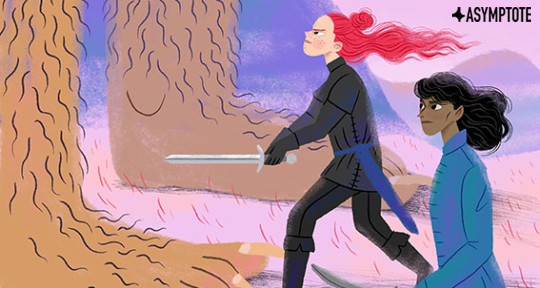Meseország mindenkié (Wonderland Belongs to Everyone) is a Hungarian collection of classic fairy tales, adapted and retold with characters from minority or marginalised groups. Yet since its release in September, it has caused astonishing controversy and rebuke from far-right politicians, including MP Dóra Dúró literally destructing a copy. Such opposition is propagating intolerance and homophobia—the antithesis of the book’s inclusive and accepting values. Despite such an alarming reaction, the publisher sold out of its first print run. But the threat of censorship still looms large. In this essay, Jozefina Komporaly explores the political circumstances that have created such hostility, as well as the book’s valuable contribution to Hungarian children’s literature.
The publication of a new volume of tales for children is usually exciting news for early readers and their families, for anyone young at heart, and for those following trends in children’s literature. It is also likely to be relevant to schools and nurseries, but it is rarely breaking news. If discussed in the media at all, it tends to belong to the realm of children’s programmes or cultural platforms. In recent weeks, however, this rule of thumb has been overturned in Hungary, where the subject of unconventional books addressed to young readers has sparked not only heated debates, but deplorable reactions from politicians and public figures.
The first time I heard about these incidents, in September 2020, was via a Facebook post alerting me to Hungarian MP Dóra Dúró tearing up the children’s book Meseország mindenkié (Wonderland Belongs to Everyone) and literally putting it through the shredder. She allegedly could not bear to see wonderland turn into a land of “the aberrant.” Dúró is a member of Mi Hazánk Mozgalom (Our Homeland Movement), a far-right satellite party of the ruling Fidesz, and news of her intervention came from her own social media presence when she boasted about destroying the book during an online press conference. According to her, “homosexual princes are not part of Hungarian culture,” and her aim was to lash out against “homosexual propaganda” that she saw as an attack against the “healthy development of children and against Hungarian culture.” The politician ended her Facebook post, hastily removed in the wake of the emergent scandal, with the invitation “to lay the foundations of the nation’s future within the context Hungarian families.” In doing so, she is perpetuating conservative notions about what constitutes a family and explicitly problematizing the relationship between nationality, patriotism, and sexual orientation.
Following Dúró’s incitement, Hungarian mass media and social platforms went into overdrive to discuss the matter, and an unprecedented number of high profile public figures took a stance against the book. Those who spoke out included numerous politicians, but also specialists in the humanities and the social sciences, such as eminent psychologist, psychiatrist, and academic Emőke Bagdy. Bagdy generated further shock waves when he also firmly condemned the publication, thus endorsing Dúró’s act. Emboldened by such support, this wave of rudimentary censorship continued with party activists boycotting public readings, displaying defamatory posters at bookshops selling the title, and with Dúró literally ripping apart another children’s book. Vagánybagoly és a harmadik Á, avagy mindenki lehet más (Cool Owl and the Third A, or Everybody Is Entitled to be Different) was published in 2019, but it ended up on the receiving end of Dúró’s rage simply because its author, Zsófia Bán, had previously delivered a speech at the opening of Budapest Pride. Judging by the nature of such interventions, it is probable that most commentators haven’t actually read either of these books. Their reactions were simply spurred by a fear of anything new, paired with ignorance and intolerance that is deeply engrained in Hungarian society and further exacerbated by the current regime in power. Homophobia, sanctioned by high-ranking politicians such as the current Speaker of the National Assembly, is on an alarming rise in present-day Hungary, and being associated with the LGBTQ+ cause is seemingly sufficient grounds for anyone to find themselves in the firing line of the so-called ‘morality police.’ In response to the controversy surrounding the book, Prime Minister Viktor Orbán notoriously declared that Hungary is tolerant to homosexuality, but “there is a red line that cannot be crossed: leave our children alone.” READ MORE…

